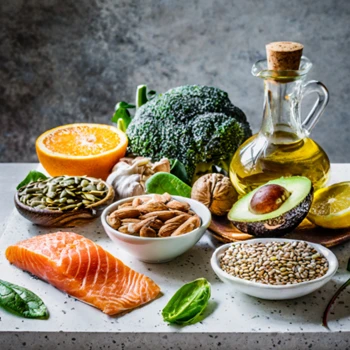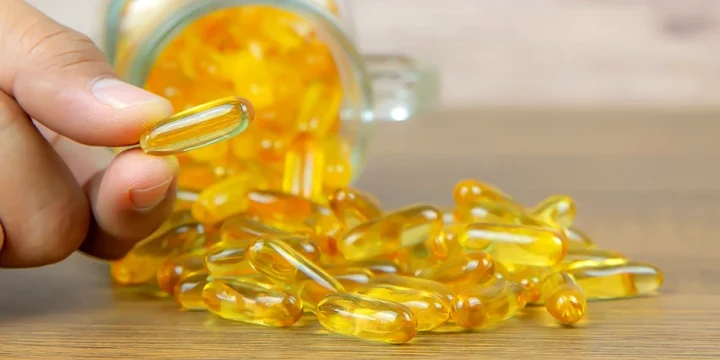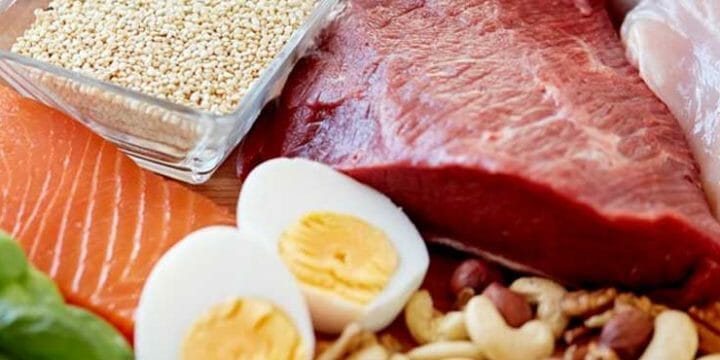The omega-3 fatty acids in fish oil are known to provide many health benefits. But if you’re not a fan of seafood or hate the fishy aftertaste of some fish oil capsules, where do you get your omega-3s?
I spent the day with a nutritionist and together, we reviewed tons of medical journals to find out the best and readily available alternatives to fish oil.
This is what we found.
Quick Summary
- The best fish oil alternatives to consider are algae, Brussels sprouts, chia seeds, perilla oil, hemp seeds, flaxseeds, and walnuts.
- Regular intake of fish oil reduces inflammation and lowers the risk of developing cardiovascular diseases.
- Nutrition experts recommend an intake of 500 mg to 1000 mg of docosahexaenoic acid (DHA) and eicosapentaenoic acid (EPA) daily which is similar to eating oily fish 2-3 times a week.
- From my own experience, integrating plant-based omega-3 sources into my diet has been a delicious and health-conscious journey well worth taking.
Can You Get Omega-3 Without Fish Oils?

Yes, you can get omega-3 fatty acids without fish oil. Omega-3-enriched eggs, certain brands of juices, milk, yogurt dressing, and soy beverages are a top choice for non-vegans. Vegans can enjoy a variety of choices including Brussels sprouts, Algae, chia seeds, algal oil, canola oil, walnuts, etc.
The Omega-3-enriched eggs contain a natural form of DHA (Docosahexaenoic acid) and EPA (Eicosapentaenoic acid). More on these types of Omega-3 acids shortly.
The natural DHA and EPA the Omega-enriched eggs contain have become a staple in my breakfast, and I feel good knowing I'm starting my day with these brain-boosting nutrients.
Vegetarian Alternatives To Fish Oil Supplements

Our research found that the best alternative sources of omega-3 polyunsaturated fatty acids are in plant-based foods such as walnuts, chia seeds, algae, brussels sprouts, leafy greens, hemp seeds, canola oil, flax, chia, and other seed oils.
Luckily, these plant sources are easy to find.
So, here’s a list of plant-based alternatives you can use instead of fish oil.
Brussels sprouts
I used to turn up my nose at Brussels sprouts, but now they're a favorite on my dinner plate. Not only are they packed with vitamins C and K, and fiber, but they're also a fantastic source of omega-3s.
One study published in the National Journal of Medicine found that increasing your consumption of cruciferous vegetables like Brussels sprouts can lower the risk of heart disease by up to 16% [1].
Algae
In my own journey to better health, I discovered that fish don’t naturally produce the omega-3 DHA and EPA; they get it from eating algae.
Because of this, it’s argued that algae pose a lesser risk of containing contaminants than most fish oil supplements because they’re at the bottom of the food chain.
Tip: Add algae to your diet by eating nori, seaweed, chlorella, and spirulina.
Chia seeds
Chia seeds have been my go-to for a protein and fiber boost for years.
Many people don’t know that they’re also an excellent plant-based source of ALA (Alpha-linolenic acid) omega-3 fatty acids.
A 2007 animal study published by the National Institutes of Health found that chia seeds in your diet can lower blood triglycerides and increase good HDL (high-density lipoprotein) cholesterol and inflammatory markers [2].
Tip: To boost your intake, sprinkle chia seeds on your salads, smoothies, or yogurts.
Algal oil
Algal oil is among the few—and best—vegan sources of DHA and EPA.
After a chat with my nutritionist, I was intrigued to learn that algal oil is akin to seafood in terms of the nutritional availability of EPA and DHA and is more readily absorbed by the body compared to fish oil.
I've since incorporated algal oil into my routine and have been pleasantly surprised by how easy it is to get these vital nutrients without the fishy aftertaste
Algal oil supplements usually provide 400-500 mg of combined EPA and DHA.
Tip: Most pharmacies carry algal oil supplements. Those in liquid form can be added to your favorite drinks or smoothies so you can get a healthy dose of fats.
Perilla Oil
Research published in the National Journal of Medicine involving 20 elderly participants found that after replacing soybean oil with perilla oil, ALA levels in their blood doubled. It also led to a rise in EPA and DHA levels in the long term [3].
Tip: Use perilla oil as a flavor enhancer or dressing rather than cooking oil. It’s because oils high in polyunsaturated fats oxidize with heat and form harmful free radicals that can cause disease.
Hemp seeds
Hemp seeds contain about 30% oil and are rich in protein, zinc, magnesium, and omega-3s.
Animal studies published in the National Journal of Medicine have shown that the omega-3 fatty acids in hemp seeds can boost heart health by preventing the formation of blood clots and helping it recover after a heart attack [4].
Tip: To up your intake of these seeds, incorporate them into your diet - in yogurt or smoothie.
Walnuts
Ever since I read about the brain health benefits of walnuts, they've become my go-to snack.
Aside from being an excellent source of omega-3 fatty acids, walnuts are also rich in healthy fats and ALA. In fact, these nuts are about 65% fat by weight.
As per reports from the National Institutes of Health, both animal and human studies have found that walnuts help improve brain health due to their omega-3 fatty acid content [5].
Tip: Add walnuts to your cereal or homemade granola, or sprinkle them on yogurt to increase your ALA intake.
Flaxseeds
Flaxseeds contain a good amount of manganese, magnesium, fiber, and protein. They’re also a good source of omega-3 fatty acids.
One of my clients speaks of how his cholesterol levels have improved thanks to the flaxseed he has been adding to his breakfast.
A study published in the National Journal of Medicine has demonstrated that it can help lower blood pressure, specifically in individuals with high blood pressure [6].
Tip: The nutty flavor of flaxseeds makes them a perfect addition to your salad or oatmeal.
Health Benefits Of Omega-3 Fatty Acids

From my own experience, I can vouch for the myriad of benefits that omega-3 fatty acids offer. I've also received positive feedback from my clients in regard to the role of omega-3 fatty acids in enhancing mental clarity and mental health, including reducing symptoms of depression and anxiety and contributing to overall psychological well-being.
They have been shown to reduce inflammation and lower the risk of cardiovascular disease, Crohn’s disease, and even menopause symptoms in women.
“Low intakes of omega-3 fats have been linked to a long, nasty list of diseases including heart attacks, depression, arthritis, Alzheimer’s, macular degeneration, autoimmune diseases, ADD, allergies, and asthma. Conversely, higher intakes of omega-3 fats have been associated with protection from many of these same diseases.”
- Ann Kulze, MD, Nutrition & Wellness Expert
There are 11 types of omega-3 fatty acids, but the most common are three; ALA, DHA, and EPA.
- Alpha-linolenic acid (ALA) is found in dark leafy greens like spinach and kale or seeds like flax and chia.
- Docosahexaenoic acid (DHA) is often found in fish oil and algae. This compound is vital to developing the retina and brains in fetuses and babies, which is why it’s often added to infant formulas. Dietary supplementation with DHA supplements can also help reduce the onset of Alzheimer’s disease.
- Eicosapentaenoic acid (EPA) is most often found in fish oils and algae. EPA minimizes inflammation in the body and the brain, which, in turn, helps alleviate symptoms of depression and anxiety. Along with DHA, EPA from fish is also crucial to reducing coronary heart disease risks.
Recommended Dietary Intake Of Omega-3 Fatty Acids
Although there are no strict guidelines, most nutrition experts recommend an intake of 500 mg to 1000 mg of docosahexaenoic acid (DHA) and eicosapentaenoic acid (EPA) daily. But if you already eat oily fish two to three times a week, you should be covered.
FAQs
What supplement is better than fish oil?
Krill oil might be better than fish oil according to researchers. While both are beneficial, Krill oil is absorbed better, contains more antioxidants, and is more effective in lowering blood glucose, triglycerides, and LDL levels. Additionally, krill oil is cheaper and more accessible compared to fish oil.
Are eggs high in omega-3?
Regular eggs aren’t that high in omega-3, but they contain some omega-3 fatty acids and about 25 mg each of DHA and ALA. Omega-3 eggs have a higher amount of these essential fatty acids, providing about 100 mg to 500 mg per egg.
References:
- https://www.ncbi.nlm.nih.gov/pmc/articles/PMC4973479/
- https://www.ncbi.nlm.nih.gov/pubmed/22090467
- https://pubmed.ncbi.nlm.nih.gov/10737229/
- https://pubmed.ncbi.nlm.nih.gov/18418423/
- https://www.ncbi.nlm.nih.gov/pmc/articles/PMC7071526/
- https://www.ncbi.nlm.nih.gov/pubmed/24126178
About The Author
You May Also Like






